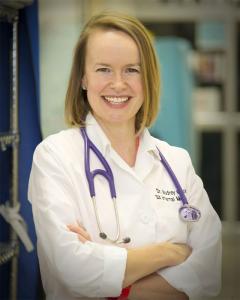Audrey Cook: USA - Class of 1989
Associate Professor at Texas A&M University
Why did you choose to study at The University of Edinburgh?
My grandfather graduated from the Dick Vet in 1926, so I grew up thinking it must be the best vet school in the world! When I was getting ready to apply to university, I visited Edinburgh and loved the city and the school. It was probably always going to be my first choice, but the people who talked to me were all very encouraging and gave me a very positive feeling about applying there.

What did you like about the Bachelor of Veterinary Medicine and Surgery degree?
This is a hard questions as I loved so much of it! I liked being part of a very connected student body. We all had the same goals and pretty much everyone shared a passion for veterinary medicine, so that was great. I felt that we had the chance to make relationships with many of our teachers; I felt known and valued. The course work was fast-paced but we all expected that. Although I am now a specialist, I really enjoyed learning about farm animals and horses, as I had little experience in those areas.
How did the R(D)SVS contribute to your career choices?
I was certainly inspired by some of the instructors, in terms of developing an interest in their areas of specialty and also seeing the value of outstanding teaching. Many of the faculty helped me secure an internship in North Carolina, which really set the stage for everything else I have done. I am very grateful for that help; I would not have had those opportunities if some of my teachers had not made the effort to help me move on.
What is your present occupation?
I am a board certified small animal internist, and am an associate professor and co-chief of the medicine services at Texas A&M University. I spend half my time on the clinic floor, seeing patients and working with house officers and students. The rest of my time is spent lecturing, reading and researching.
I followed my internship at NC State with a residency in internal medicine at UC Davis. I am boarded by ACVIM, ECVIM and ABVP (Feline Practice).
I would urge every new student to be open to all the opportunities that await. You may have a firm idea of what you will be doing when you graduate, but you really don't know what lies ahead and should welcome chances to learn new things and take on new experiences.
Did your EMS placements help you in determining the field of veterinary medicine you wanted to pursue professionally?
Absolutely not! I wanted to be a dairy vet for much of my time at Edinburgh and therefore spent most of my EMS at a predominantly farm animal practice in Scotland. However, I really enjoyed all aspects of veterinary medicine and thought I'd probably join a mixed animal practice when I graduated. However, one very cold winter made me decide I wanted an indoor job, so I switched my plans to SA. I was inspired to try for an internship by one of our farm animal instructors; he had just come back from a year in the States and made it sound very fun. So, I applied for SA internships and was lucky enough to be offered a place in North Carolina. That changed everything for me.
Can you tell us of any personal or professional achievements in your career progression?
I started my own specialty practice in Virginia and ran it very successfully for almost a decade before changing my focus to teaching. I am proud of that, as it was challenging and scary at times, but it all worked out and I learned an enormous amount. Since returning to an academic environment, I have learned a lot about teaching and have been recognized for those efforts, which also means a lot to me. I recently spoke at the biggest veterinary CE event in the world (the NAVC meeting in Orlando) to a room with over 750 people... that was quite something! I have also been one of the leaders here at Texas A&M for interventional procedures and work on the majority of those cases. It has been very exciting to learn those new techniques and use them to help patients with very few other options.
If you could offer some advice to prospective students what would it be?
I would urge every new student to be open to all the opportunities that await. You may have a firm idea of what you will be doing when you graduate, but you really don't know what lies ahead and should welcome chances to learn new things and take on new experiences. I would also urge them to enjoy vet school as much as possible; those 5 years were some of the happiest of my life and I wish I had savoured those times with my friends and flatmates more than I did. I would also pay a lot more attention in physiology as it is the basis of medicine and nothing makes sense if you don't grasp those ideas early on!


